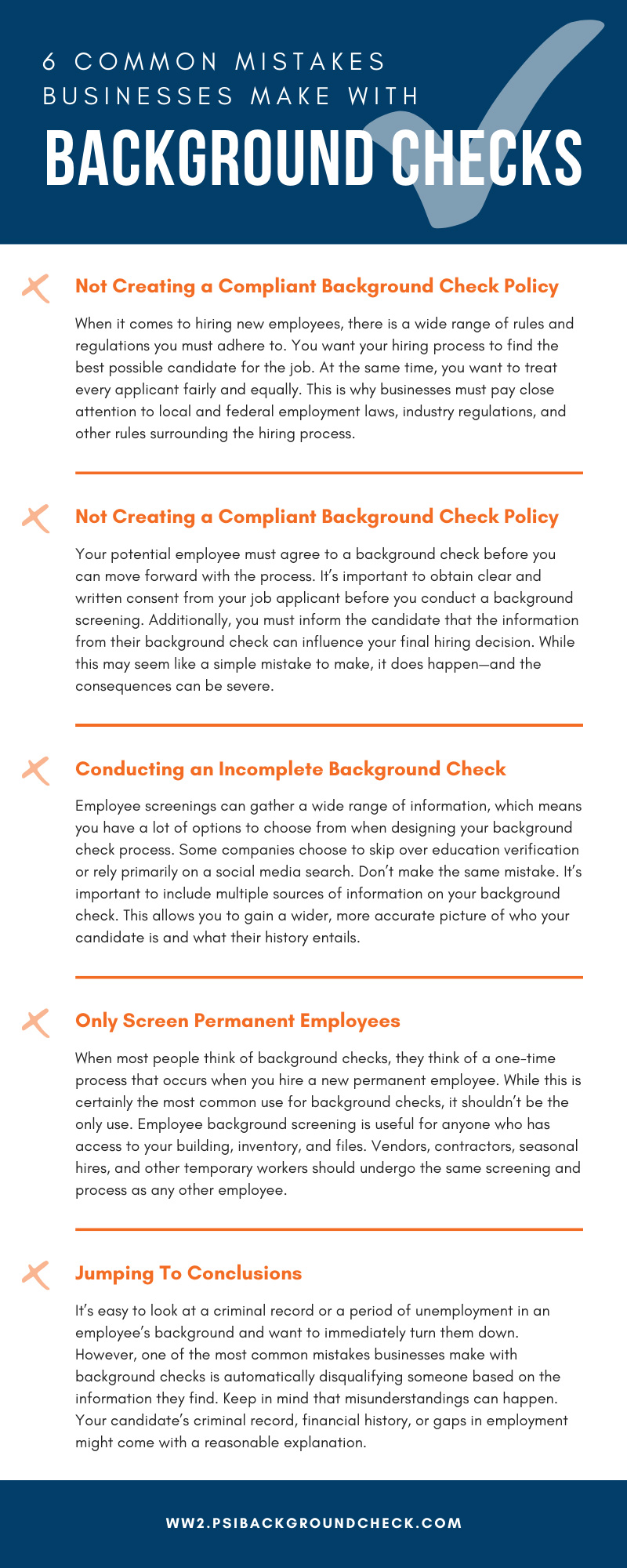6 Common Mistakes Businesses Make With Background Checks
PSI Team | Uncategorized
Background checks can be a huge benefit to your company, but only if you do them right. The regulations surrounding employee screenings make it essential for businesses to create a compliant and effective process for every new candidate they hire. Unfortunately, many businesses either cut corners or make mistakes with their screening process—mistakes that can deal a huge blow to your budget and reputation if you’re not careful. A successful hiring policy includes a successful background check process. Read below to learn about how to avoid the most common mistakes businesses make with background checks.
Not Creating a Compliant Background Check Policy
When it comes to hiring new employees, there is a wide range of rules and regulations you must adhere to. You want your hiring process to find the best possible candidate for the job. At the same time, you want to treat every applicant fairly and equally. This is why businesses must pay close attention to local and federal employment laws, industry regulations, and other rules surrounding the hiring process. Failure to follow these rules can lead to lawsuits from applicants or even current employees, which can cost your business a great deal in money and reputation. It helps to establish a background check policy within your company. A standard policy can help you and your hiring team navigate the process while staying compliant and fair to all employees and applicants. Make sure everyone involved in the process understands and respects the rules surrounding background checks and candidate information. A specialized hiring team and a standard policy to follow give your hiring process a sense of consistency and professionalism every time you bring a new employee on board.
Proceeding Without Employee Consent
Your potential employee must agree to a background check before you can move forward with the process. It’s important to obtain clear and written consent from your job applicant before you conduct a background screening. Additionally, you must inform the candidate that the information from their background check can influence your final hiring decision. While this may seem like a simple mistake to make, it does happen—and the consequences can be severe. Obtaining employee consent is a requirement from the Fair Credit Reporting Act. Failure to do so, even by accident, can result in a class-action lawsuit against your company. Make sure you have your employee’s signed consent on file before you proceed with the background check process. You should also check with any state and local laws regarding employee consent, as some areas have additional requirements such as special notices or disclosures you must provide to your employee.
Conducting an Incomplete Background Check
Employee screenings can gather a wide range of information, which means you have a lot of options to choose from when designing your background check process. Some companies choose to skip over education verification or rely primarily on a social media search. Don’t make the same mistake. It’s important to include multiple sources of information on your background check. This allows you to gain a wider, more accurate picture of who your candidate is and what their history entails. Verify an applicant’s education history as well as their employment history. This will ensure that the degrees and training the candidate put on their application are accurate. You should also conduct a federal background check as well as a multi-state screening. Performing both checks gives you a thorough look at your candidate’s criminal record in both federal and state or county databases.
Only Screen Permanent Employees
When most people think of background checks, they think of a one-time process that occurs when you hire a new permanent employee. While this is certainly the most common use for background checks, it shouldn’t be the only use. Employee background screening is useful for anyone who has access to your building, inventory, and files. Vendors, contractors, seasonal hires, and other temporary workers should undergo the same screening and process as any other employee. While some companies see this as a waste of resources, the investment is worth it as you avoid hiring unsafe, irresponsible, or ill-intentioned workers for your company.
Jumping To Conclusions
It’s easy to look at a criminal record or a period of unemployment in an employee’s background and want to immediately turn them down. However, one of the most common mistakes businesses make with background checks is automatically disqualifying someone based on the information they find. Keep in mind that misunderstandings can happen. Your candidate’s criminal record, financial history, or gaps in employment might come with a reasonable explanation. Furthermore, people can learn and move on from their old mistakes. It’s also a good idea to prioritize the information that is relevant to that specific job. For example, if someone is applying for a driving position, you want to focus on their driving record. For any roles that handle finances, pay attention to the credit history that comes up in the candidate’s background check. These will be the most reliable indicators as to whether or not someone is a good fit for the role. No matter what, you should be careful of going into the process with any hard lines about your candidate’s history. If you do decide to turn someone down based on the information in their background check, make sure you follow adverse action guidelines. This includes informing the employee of your decision and giving them time to refute or explain the information in their background check.
Conducting Background Checks Yourself
Some companies attempt to conduct their background checks in-house. This might seem easier than outsourcing the service, especially with social media and online search engines at your fingertips. Unfortunately, you’re more likely to run into false or irrelevant information and other roadblocks along the way if you take this route. Even if you take the time to conduct a thorough and compliant background check yourself, the process will still take much longer than if you hire a professional background investigation service. Professional companies like PSI Background Screening have established connections and access to the data you need. This makes the procedure far more efficient and cost-effective, allowing you to continue your hiring process with as little hassle as possible. Furthermore, professional background screening companies are well-versed in the legal standards surrounding background checks. We’ll help you avoid any compliancy issues and ensure you end up with accurate information that you can easily access and use whenever you need to.
